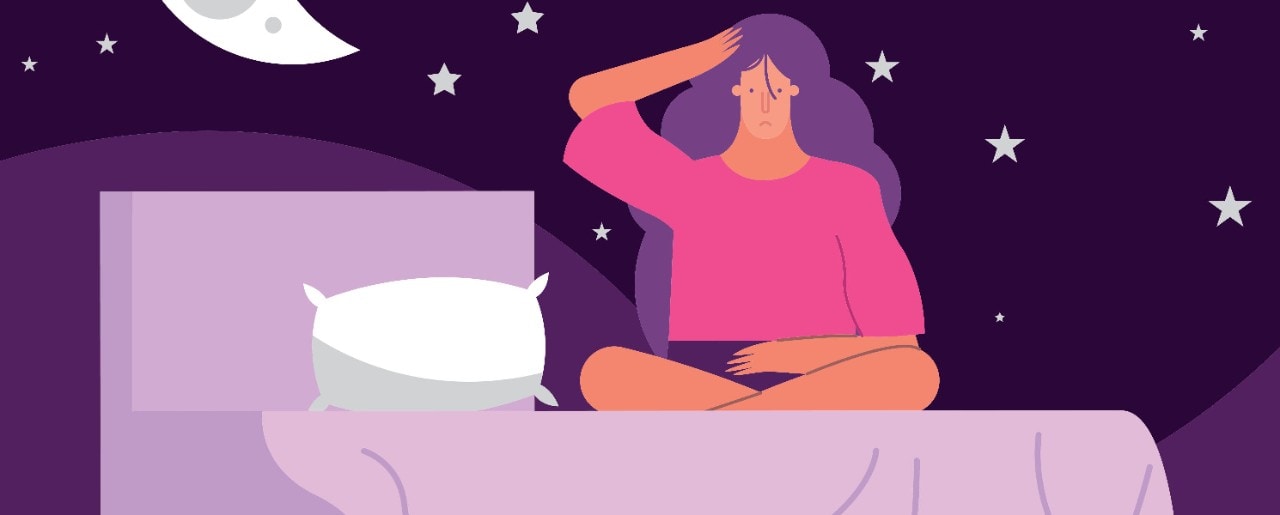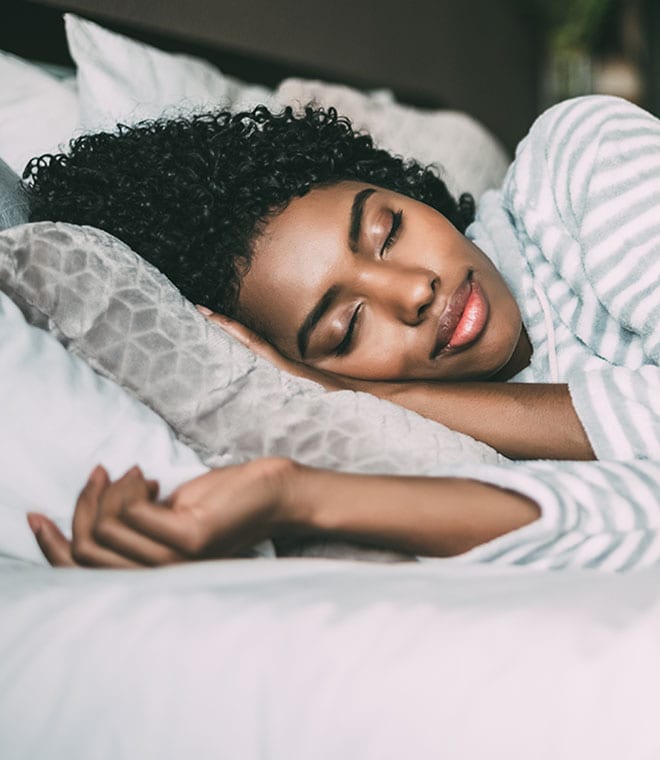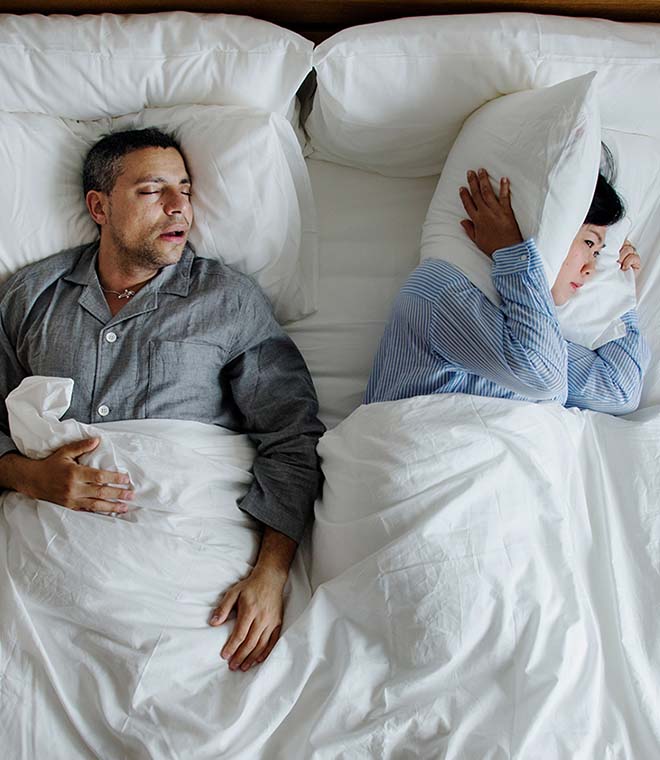Wellness
Insomnia in women: What you should know
By Jenilee Matz, MPH Feb 07, 2025 • 9 min
One in 4 women suffer from insomnia, which includes trouble falling or staying asleep. Anyone can have insomnia, but it affects women more often than men. Women may often experience insomnia as a symptom of other health conditions, including pregnancy, menopause, depression, anxiety or fibromyalgia.
What is insomnia?
Insomnia is a sleep disorder marked by symptoms such as:
- Difficulty falling asleep (sleep-onset insomnia) or staying asleep
- Waking up too early and not being able to go back to sleep (sleep maintenance insomnia)
Do I have insomnia?
If you're having trouble going to sleep or staying asleep at night or you find yourself waking up too early and feeling unrested after sleep for at least three nights each week over a three-month period, you may have chronic or long-term insomnia.
Insomnia can affect all aspects of your life, making it difficult to perform well at work or school, or care for yourself or your family. If left untreated, chronic insomnia can lead to other medical issues, such as heart disease, stroke or depression.
You can also experience acute or short-term insomnia. This type of insomnia is temporary, such as jet lag after a trip.
Primary vs. secondary insomnia
Insomnia can be classified as primary or secondary. Primary insomnia is not a symptom or side effect of another condition; it's a stand-alone disorder. Secondary insomnia, on the other hand, occurs due to another health issue or as a side effect of a medication. For instance, if you cannot fall sleep due to hot flashes caused by menopause, you may have secondary insomnia. Your healthcare provider may diagnose primary insomnia only after ruling out other factors as the cause.
What causes insomnia?
Insomnia can be caused by health issues, including medications and other factors. Medical reasons that can trigger or occur at the same time as secondary insomnia include:
- Pregnancy. Insomnia in pregnancy can be due to hormones, back pain, heartburn, frequent urination at night, discomfort, stress and other factors. Insomnia in early pregnancy or first trimester insomnia, for instance, may occur due to morning sickness if your nausea causes you to rise before you're ready to wake up.
- Menopause. Insomnia and menopause often go hand in hand. This is likely due to the symptoms of menopause, such as hot flashes and night sweats, which can make it challenging to get quality sleep.
- Other hormonal conditions, including premenstrual dysphoric disorder (PMDD) or thyroid problems.
- Mental health conditions, such as depression, anxiety and post-traumatic stress disorder (PTSD).
- Chronic pain due to arthritis, fibromyalgia or other painful conditions.
- Breathing issues from sleep apnea and asthma.
- Traumatic brain injury and neurological disorders, such as Alzheimer's disease or Parkinson's disease.
- Sleep disorders, including restless leg syndrome.
- Cancer, including symptoms, side effects of certain treatments, stress and hospital stays.
- Heartburn and other gastrointestinal problems.
- Side effects from medications, especially medicines used to treat cancer, heart disease, and cold and flu symptoms.
Other causes of insomnia include:
- Stress. Chronic worries can cause your mind to race, which can make sleeping difficult. Major life events, such as a death or job loss, can also lead to insomnia.
- Work or travel schedules. Working changing shifts or traveling across time zones frequently for work can throw off your body's sleep-wake cycle, leading to sleep disruptions.
- Poor sleep habits. Having an irregular bedtime schedule, taking naps or sleeping in an uncomfortable environment can lead to trouble sleeping.
- Other habits, such as eating late at night, consuming caffeine or alcohol, or using nicotine can lead to trouble sleeping. Eating too much before bedtime can cause discomforts, like heartburn, that can interfere with sleep. Caffeine (from coffee and other foods and beverages) and nicotine (found in tobacco-containing products) are stimulants that can hinder sleep. Alcohol can alter the stages of your sleep cycle, which can cause you to wake up in the middle of the night.
- Aging. The chance of insomnia occurring increases with age. Our internal clock shifts as we age, which can cause an earlier bedtime and wake time.
Insomnia symptoms
Women with insomnia have trouble sleeping. Specifically, you may:
- Lay awake for a long time without being able to fall asleep
- Wake up in the middle of the night and have trouble going back to sleep
- Wake up too early
- Feel tired when you wake up
It's also common to have other symptoms during the day as a result of insomnia. You may not feel rested and may have low energy levels throughout the day, which can cause you to feel irritable, anxious and depressed. You may also find it hard to pay attention, focus or remember things.
How is insomnia treated?
See your healthcare provider if you have symptoms of insomnia. Your provider will likely ask you about your sleep habits, give you a physical exam, and possibly perform tests to rule out other causes of sleep problems. You may need a sleep study.
Treatment may involve addressing the underlying cause of secondary insomnia. As a natural insomnia remedy, you can try changing some habits to improve your sleep.
- Go to bed and get up at the same time each day, keeping a regular schedule
- Keep your bedroom cool, dark and quiet
- Avoid alcohol, caffeine, nicotine and heavy meals in the hours before bed
- Exercise regularly but finish your workout at least five hours before you plan to go to sleep
- Follow a relaxing bedtime routine and unwind by reading the paper or writing in a journal instead of watching TV or playing on your phone (artificial lights from screens can interfere with sleep)
If these approaches don't work, your healthcare provider may recommend cognitive behavioral therapy, medication for insomnia or other strategies.
Cognitive behavioral therapy (CBT)
Studies show that CBT can be just as effective as prescription medications and is often the first choice for treating chronic insomnia. CBT involves changing thoughts or actions that get in the way of sleep. CBT may involve working with a therapist to track your sleep, replace negative thoughts about sleep with positive ones, and adjust your lifestyle so you can sleep better.
Insomnia medications
There are over-the-counter (OTC) and prescription medications that can aid in sleep. Many OTC sleep aids contain antihistamines that can cause drowsiness, but these products are not meant for long-term use. In certain cases, such as chronic insomnia, your healthcare provider may decide a prescription sleep aid is needed.
Prescription sleep aids may include sedatives, antidepressants and antianxiety medicines. Examples include trazodone, mirtazapine, lorazepam, zolpidem (Ambien) or suvorexant (Belsomra). As with all medications, OTC and prescription sleep aids can have side effects. Your provider can help determine if a sleep aid is right for you.
If you have trouble falling or staying asleep, talk with your healthcare provider. They can create a treatment plan for your insomnia so you can get a good night's sleep.
Updated by Julie McDaniel, MSN, RN, CRNI, February 2025.
Sources:
- https://www.mayoclinic.org/diseases-conditions/insomnia/symptoms-causes/syc-20355167
- https://www.womenshealth.gov/a-z-topics/insomnia
- https://www.uptodate.com/contents/insomnia-treatments-beyond-the-basics
- https://americanpregnancy.org/pregnancy-health/insomnia-during-pregnancy/
- https://www.sleepfoundation.org/pregnancy/sleeping-during-1st-trimester
- https://www.sleepfoundation.org/mental-health/depression-and-sleep
- https://www.merckmanuals.com/professional/neurologic-disorders/sleep-and-wakefulness-disorders/insomnia-and-excessive-daytime-sleepiness-eds
- https://www.sleepfoundation.org/insomnia/diagnosis
- https://medlineplus.gov/ency/article/000805.htm
- https://www.nia.nih.gov/health/sleep-problems-and-menopause-what-can-i-do
- https://www.womenshealth.gov/menstrual-cycle/premenstrual-syndrome/premenstrual-dysphoric-disorder-pmdd
- https://www.mayoclinic.org/healthy-lifestyle/adult-health/expert-answers/sleep-aids/faq-20058393
- https://www.cancer.gov/about-cancer/treatment/side-effects/sleep-disorders-pdq#_3
- https://www.nccih.nih.gov/health/sleep-disorders-and-complementary-health-approaches




